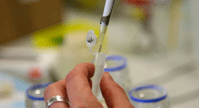Phosphofructokinase Deficiency (PFKD)
Description:
Phosphofructokinase Deficiency (PKFD) is an autosomal recessive disorder that affects Cocker Spaniels. This metabolic disorder does not allow the PFK enzyme to function properly, affecting the energy-producing glycolytic cycle and destroying red blood cells. A lack of oxygen-carrying red blood cells and glucose leads the dog to experience anemia and exercise intolerance. The dog may also feel cramping of the muscles.
PFKD is a recessive disorder, so a dog can be a carrier of PFK deficiency and not display any symptoms associated with the disorder. It is estimated that at least 10% of the cocker spaniel population are obligate carriers, so testing is important to identify carriers. If two carriers of PFKD are bred, there is a 25% chance that the offspring could receive the mutated allele from each parent and be affected by the disease.
This condition is treatable with bone marrow transplantation, although the procedure is extremely expensive. Dogs are able to have a normal quality of life if PFKD is properly managed. Dogs should be kept in low-stress environments and should not be allowed to strenuously exercise.
Acceptable Sample Types:
Animal Genetics accepts buccal swab, blood, and dewclaw samples for testing. Complimentary sample collection kits are available and can be ordered at test now.
This Testing is Relevant For the Following Breeds:
American Cocker Spaniel, English Cocker Spaniel, Cocker Spaniel
Results:
Animal Genetics offers DNA testing for the PFKD allele. The genetic test verifies the presence of the mutation and presents results as one of the following:
| PFKD/PFKD | Affected | The dog carries two copies of the mutant gene and is homozygous for PFKD. The dog will display symptoms associated with the disorder and will always pass a copy of the mutation to its offspring. |
| PFKD/n | Carrier | Both the normal and mutant copies of the gene detected. The dog is a carrier for PFKD and could pass on either allele to any offspring |
| n/n | Clear | Dog tested negative for the PFKD mutation and will not pass on the defective gene to its offspring. |
Submit a Sample for Testing:
To submit a sample for testing please go to test now.
To order a sample collection kit please go to order sample collection kits.
Cost per sample is - Call. Please see our Canine Fee Schedule for all test rates.










